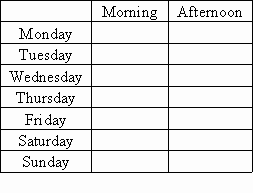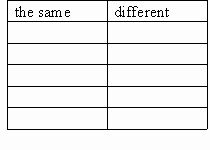
题目列表(包括答案和解析)
情景交际。
根据对话的情景,从方框中选择适当的句子填在画线处,使对话完整通顺。Jane:Tomorrow is Saturday.What do you often do on weekends?
Bill: 1 What about you?
Jane:I often go to the movies.
Bill: 2 How often do you go to the movies?
Jane: 3
Bill:What's your favorite movie?
Jane: 4
Bill:Who do you often go with?
Jane: 5
Bill:Are you going there this weekend?
Jane:Yes, do you want to go with us?
Bill:Sorry, I have a lot of work to do.

How often do you use the Internet? Most American teens spend a lot of time emailing friends and surfing the Internet.
A new study of more than 2,500 teens made by Yahoo says that more teens use the Internet than watch television. In an average week, an American teen will spend:
1) 16.7 hours online (not including emailing),
2) 13.6 hours watching TV,
3) 12 hours with the radio on,
4) 7.7 hours on the phone,
5) 6 hours reading books and magazines (not including school books).
The study says that being able to choose what you look at is the main reason teens choose the Internet over other types of media
(传媒).On a typical day, an American teen can choose from over 200 cable television networks
(有线电视网), 5,500magazines, 10,500 radio stations, more than 30 million websites, and 122,000 new books.The number of Internet users in China has grown by 15 per cent over the past six months to 68 million. This is the second largest online population in the world after the US.
True or false:
(1) Nowadays American teens spend more time online than other types of media.
( )
(2) They spend the most time on books and magazines in an average week.
( )
(3) The main reason teens choose the Internet is that they can choose what they look at.
( )
(4) An American teen cannot widely choose networks or websites.
( )
(5) The number of Internet users in China has grown greatly.
( )
(6) The US has the second most online users in the world.
( )
朗读下面的对话,并运用后面列出的交际用语把该对话完成,注意其中有两项为多余选项。
-________
-I usually get up at six o'clock in the morning.
-________
-I usually take the bus.
-Do you take the bus every day?
-________
-________
-It's five miles.
-________
-It takes about twenty-five minutes.
[ ]
①How often do you get to school?
②How far is it from your home to school?
③No, sometimes I ride my bike.
④What time do you get up every day?
⑤How long does it take you to get from home to school?
⑥How do you get to school?
⑦Sorry, I don't know.
学习语言的关键在于应用。请你根据提示词语及句型,踊跃参加以下活动吧!相信你一定是佼佼者!
A.Who is Dr. Know?
Choose a problem from the list below. Ask your classmates for advice. Who gives the best advice is “Dr. Know”.
提示词语及句型:
1)Problems: toothache, stressed out, hungry, backache, cold, sorethroat, tired, headache, thirsty
2)What's the matter?
You should (shouldn't)…
3)lie down, go to bed, see a dentist, listen to music, go out, drink, eat, have a rest, exercise…
B.Who is the healthiest?
Make a survey about what some of your classmates do and how often they do on weekends. Tell it to your classmates. Take a vote:
Who is the healthiest?
提示词语及句型:
1)always, usually, often, sometimes, hardly ever, never, watch TV, read books, exercise, shop, surf the Internet, play football
2)What do you usually do on weekends?
How often do you watch TV?
C.Vacation Dreams
Imagine your dream vacation. On a piece of paper, write what you are doing for vacation, when you are going and how long you are staying there. Put your paper in a bag, then take another paper from the bag. Find the students who has your paper.
提示词语及句型:
1)go camping, go bike riding, go sightseeing, take walks, visit, on Monday, tomorrow, the day after tomorrow, on the 12th, next week, for a week, for three days
2)Where are you doing for vacation?
What are you doing for vacation?
When are you going?
How long are you staying there?
D.Find someone who…
Ask three of your classmates questions. Write their answers in the table below. The first student to fill in all the blanks wins.
提示词语及句型:
1)walk to, ride my bike, take the bus (train, subway), get to school
2)How do you get to school?
How long does it take?
How far is it from…to…?

E.Plan a party
Write everything you have to do next week, and fill in the table below. Choose a day and time to have a party. Then invite classmates to your party.
提示词语及句型:
1)study, have a lesson, visit, help, play football, go to the movies, watch TV
2)Can you come to my party?
I have to…
What are you doing on Tuesday?

F.The same and different
Write your name on a piece of paper and put it in a bag. Take a paper from the bag to find a partner. You have three minutes to make a list of things that are the same and different between you and your partner. The pair with the most items wins.
提示词语及句型:
1)tall, quiet, athletic, serious, intellectual, thin, funny
2)He is taller than me.
We are both girls.

| |||||||||||||||||||||||||||||||||||||||||||||
湖北省互联网违法和不良信息举报平台 | 网上有害信息举报专区 | 电信诈骗举报专区 | 涉历史虚无主义有害信息举报专区 | 涉企侵权举报专区
违法和不良信息举报电话:027-86699610 举报邮箱:58377363@163.com